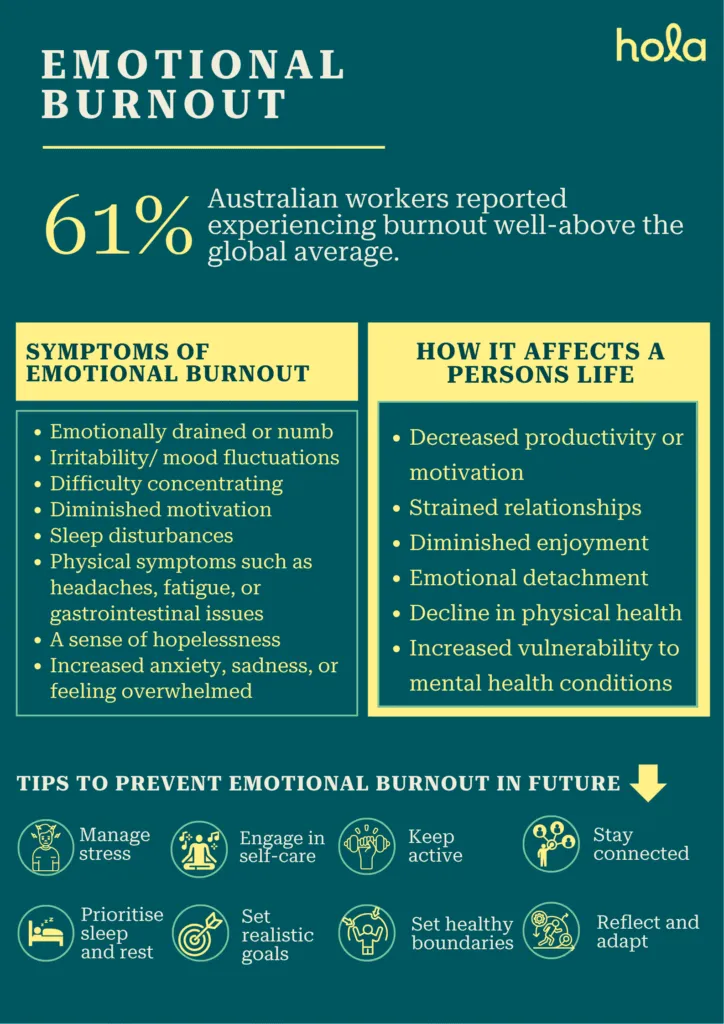Emotional burnout: Causes, symptoms, and solutions
Written by editorial staff writer at Hola. Medically reviewed by Amira Shah, MA in Counselling Psychology, Registered Psychotherapist.

Contents

Summary: Emotional burnout is a mental and physical depletion caused by prolonged stress. It stems from work pressure, life demands, and a lack of self-nurturing. Common signs include exhaustion, irritability, and detachment. Burnout can be managed and even reversed with mindfulness, boundaries, and support, bringing balance and well-being back into your life. The doctors, whether via telehealth or in-clinic, can help you heal and work on the issue, provide medical guidelines, scripts or referrals if needed and an online medical certificate if time off is needed.
Ever feel like your mind is drained, your energy’s at zero, and even the things you love feel like a chore? You might be dealing with emotional burnout. It’s more common than you might think, especially in our hustle-heavy world that never hits pause. An alarming 61% of Australian workers reported experiencing burnout, well above the global average of 48%. But here’s the good news. By understanding what causes burnout, spotting the signs early, and learning how to bounce back, you can recharge and rediscover joy in everyday life. Let’s dive in and see how!
Importance of recognising emotional burnout in today's fast-paced world.
Recognising emotional burnout is essential in today's fast-paced environment, where constant stress, pressure, and digital noise can quietly deplete our mental energy. Emotional burnout frequently accumulates unnoticed, resulting in fatigue, irritability, detachment, and even physical ailments. Identifying it early enables us to take a break, reset, and seek help, preventing longer-term health problems and enhancing our overall well-being and productivity.What is emotional burnout?
Emotional burnout is a condition of mental and emotional fatigue triggered by extended stress, overwhelming responsibilities, or continual emotional demands. It typically develops over time and can leave an individual feeling exhausted, disconnected, hopeless, or unable to manage. Unlike ordinary tiredness, emotional burnout doesn’t simply vanish with rest; it often necessitates deeper recovery, lifestyle adjustments, and professional assistance.Causes of emotional burnout
Emotional burnout can result from ongoing pressures at work, caregiving, or personal obligations without sufficient time for rest or recovery. It frequently arises from high emotional demands, such as providing support to others while neglecting one’s own needs. Additional factors include poor work-life balance, lack of control over circumstances, feelings of being unappreciated, perfectionism, and unresolved trauma. Continuous emotional suppression or the expectation to remain “strong” can also play a role, gradually draining your emotional resilience and leading to burnout.Symptoms of emotional burnout
Signs of emotional burnout include:- Feeling emotionally drained or numb
- Irritability or fluctuations in mood
- Difficulty concentrating or making choices
- Diminished motivation or disinterest in activities that once brought joy
- Sleep disturbances (too much or too little)
- Physical symptoms such as headaches, fatigue, or gastrointestinal issues
- A sense of hopelessness or disconnection from others
- Increased anxiety, sadness, or feeling overwhelmed
Ready for positive change? Start your mental health care plan here.
Book an appointment
Fully bulk-billed, across Australia.
How emotional burnout affects your life
Emotional burnout can significantly affect your daily life.- Decreased productivity and motivation: Burnout can hinder your ability to concentrate, meet deadlines, or feel driven, even with simple tasks.
- Strained relationships: You might feel too exhausted or unable to connect emotionally, leading to strain or a sense of distance in your relationships with loved ones.
- Diminished enjoyment: Activities that used to bring joy may now feel futile or exhausting.
- Emotional detachment: You might experience numbness, disconnection, or indifference toward your environment or others.
- Decline in physical health: Burnout can lead to headaches, tiredness, digestive problems, or aggravate existing health issues.
- Increased vulnerability to mental health conditions: If left unaddressed, burnout can contribute to anxiety, depression, or chronic stress.
Solutions for overcoming emotional burnout
Emotional burnout represents extreme stress that leaves you feeling drained and overwhelmed. Taking prompt action can facilitate recovery and help you regain balance.- Identify the signs early: Recognising and accepting that you’re experiencing burnout is the crucial first step toward recovery.
- Establish healthy boundaries: Reduce overcommitment and learn to decline requests without guilt to safeguard your energy.
- Focus on rest and self-care: Allocate time for activities that relax and rejuvenate you, like sleep, exercise, or hobbies.
- Seek social support: Engage with friends, family, or a trusted individual to prevent emotional isolation.
- Reassess your workload: Modify your responsibilities if feasible, and request assistance or delegate tasks when necessary.
- Embrace mindfulness: Practising breathing exercises, meditation, or journaling can help alleviate stress and reconnect you with the present moment.
- Consult a professional: Therapists or online mental health resources can support you on your journey to recovery and strengthen your emotional resilience.
How to prevent emotional burnout in the future
Emotional exhaustion occurs when stress becomes too overwhelming. To avoid it, it's essential to care for your mind, body, and boundaries daily.- Establish clear boundaries: Safeguard your energy by saying no when necessary. Distinguish between your professional and personal life and avoid energy-draining situations to lower stress levels.
- Effectively manage stress: Identify your stress triggers early on. Employ relaxation techniques such as meditation or deep breathing, and take regular breaks to refresh your mind.
- Emphasise rest and sleep: Strive for 7 to 9 hours of quality sleep each night. Reduce screen time before sleeping and create a soothing nighttime routine.
- Engage in regular self-care: Participate in enjoyable activities such as hobbies or walks. Consistently prioritise self-care as a crucial aspect of your daily life.
- Stay connected: Reach out to friends, family, or therapists for support. Sharing your emotions helps to alleviate feelings of isolation and lighten your emotional load.
- Keep active: Engage in regular physical activity to enhance your mood and reduce stress hormones. Discover enjoyable activities like yoga, walking, or dancing to remain active.
- Set realistic goals: Break larger tasks into smaller portions. Avoid taking on too much by focusing on what’s important and sharing responsibilities. Recognise and celebrate small accomplishments to maintain motivation.
- Reflect and adapt: Regularly check in with yourself. Utilise journaling to identify early signs of burnout and modify your habits before stress escalates.

What is online therapy & consultation options
Online therapy and consultations refer to mental health services accessed remotely over the internet, utilising video calls, phone conversations, chat, or apps. Rather than meeting with a therapist or counsellor in person, you can connect from anywhere using a computer, tablet, or smartphone. This allows for increased flexibility and accessibility, especially for individuals who find it challenging to visit a clinic. Online therapy may include individual counselling, couples therapy, group sessions, or psychiatric evaluations. Licensed professionals support you in navigating emotional or mental health challenges, applying the same evidence-based techniques as traditional face-to-face therapy. Consultations might also include general health advice, second opinions, or specialised assessments, varying based on the service provider.Conclusion:
Emotional burnout might feel like a dead end, but it’s just a signal to slow down, take a breath, and recharge. With the right support, care, and perspective, you can shift from drained to energised, for every part of life, not just your career.FAQs
Can emotional burnout affect my relationships?
Yes, emotional burnout can strain relationships by triggering frustration, detachment, and mental fatigue, making it harder to connect, communicate, and support others.How to treat emotional burnout?
Start by focusing on rest and self-care—get enough sleep, eat nourishing meals, and stay active. Set boundaries, take breaks, and learn to say no when it’s too much. Practice mindfulness, confide in someone you trust, and seek professional support if needed. Small, consistent steps can lead to significant change.Is it possible to recover from emotional burnout?
Definitely. With patience, self-care, support, and lifestyle changes, most individuals can fully recover from emotional burnout. The key is identifying it early and taking intentional steps to pause, heal, and regain stability.How can Hola Health help with emotional burnout?
Hola Health makes mental health support simple and accessible, featuring virtual consultations with experts, customised care plans that are fully bulk-billed in Australia, and resources for managing stress. Whether you’re looking for someone to listen or practical ways to regain balance, Hola Health is here to support you in overcoming burnout and fostering a healthier, more resilient version of yourself.Do I need to leave work to recover from emotional burnout?
Not always. Many people recover by setting healthy boundaries, taking breaks, and caring for themselves without leaving their work. However, if burnout is severe, a temporary leave or lighter workload may be necessary. Always put your health first and seek professional advice if unsure.Can emotional burnout lead to other mental health issues?
Yes, if ignored, emotional burnout can increase the risk of depression, anxiety, and chronic stress, making early recognition and support essential.How do I know if I am experiencing emotional burnout or just stress?
Stress is often temporary and linked to specific tasks or events, while emotional burnout develops gradually, causing profound fatigue, disconnection, and feelings of despair. If you constantly feel drained, unmotivated, or emotionally numb, you may be experiencing burnout rather than just stress.Can emotional burnout affect my physical health?
Yes, emotional burnout can affect your physical health. It may lead to headaches, insomnia, digestive issues, weakened immunity, and a higher risk of heart conditions. Chronic stress impacts both mind and body, so it's important to address burnout early for overall health.Is emotional burnout the same as stress or depression?
No, emotional burnout is not the same as stress or depression, but they are connected. Stress is usually a temporary reaction to specific challenges. Burnout is long-term exhaustion from chronic stress, especially in professional or caregiving environments. Depression is a clinical mental health condition that affects emotions, thoughts, and behaviour. If burnout isn’t addressed, it can lead to depression.What are the best self-care practices for emotional burnout?
The best self-care practices for emotional burnout include:- Rest and adequate sleep
- Mindfulness and relaxation techniques
- Taking breaks
- Setting healthy boundaries
- Regular physical activity
- Eating balanced meals
- Spending time with loved ones or indulging in hobbies
- Seeking professional help when needed
Take control of your mental health. Begin your care plan now.
Book an appointment
Fully bulk-billed, across Australia.
What we treat
- Cough
- Nausea & vomiting
- Fever
- Hayfever
- Fatigue
- Sore throat
- Acne
- Hair loss
- Gout
- Eczema
- Rosacea
- Sunburn
- UTI
- Erectile dysfunction
- Contraception
- Morning sickness
- Morning after pill
- Prostate health
- Anxiety
- Depression
- Stress
- Grief & loss
- Antidepressants
- Premature ejaculation
- Asthma
- Blood pressure
- Blood thinners
- Diabetes
- Cholesterol
- Migraines & headaches
- Allergies
- Body ache
- Heartburn & reflux
- Sleep disorder
- Pain relief
- Gastro
Related Articles
What Is Online Therapy? Everything You Need To Know About e-Therapy
February 19, 2026Mental Health
...
Disclaimer
This blog is for general informational purposes only and does not indicate that Hola Health provides all treatments or preventive measures mentioned. It is not intended to be a substitute for professional medical advice. Always seek the guidance of your doctor or other qualified health professional with any questions you may have regarding your health or a medical condition. For emergencies please immediately contact 000. Any medical topics discussed are intended to educate, not to imply availability through Hola Health.
 Facebook
Facebook  X
X  Copy Link
Copy Link



